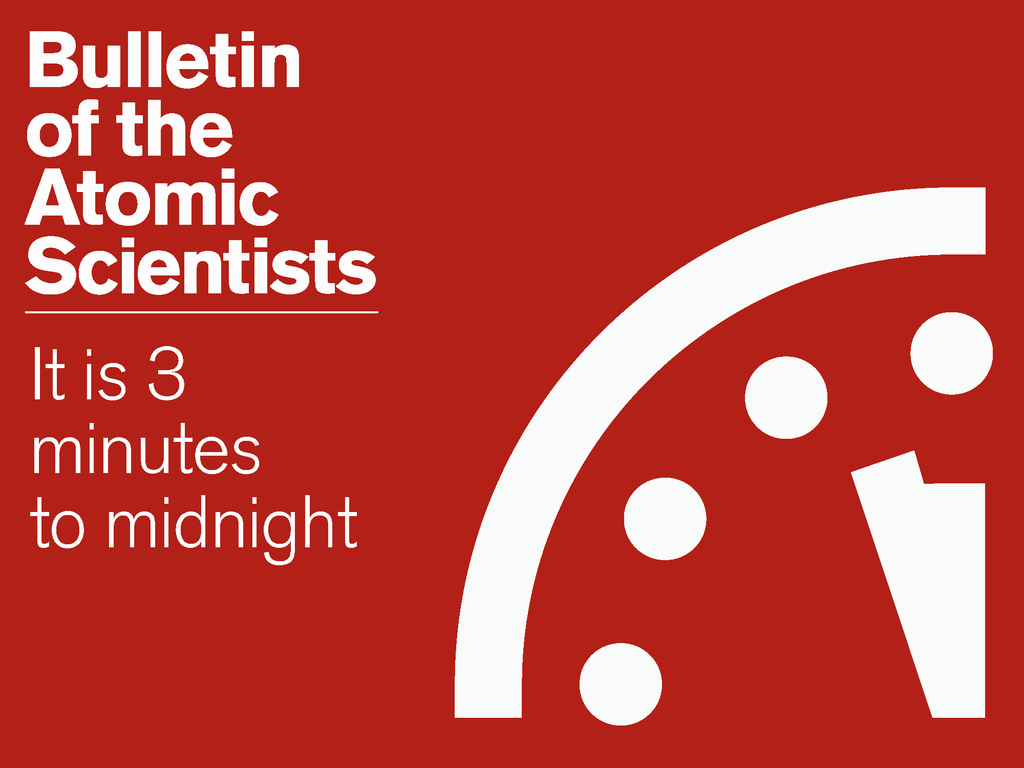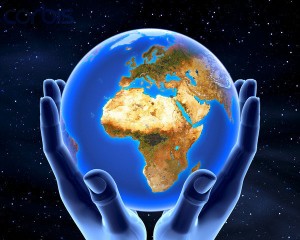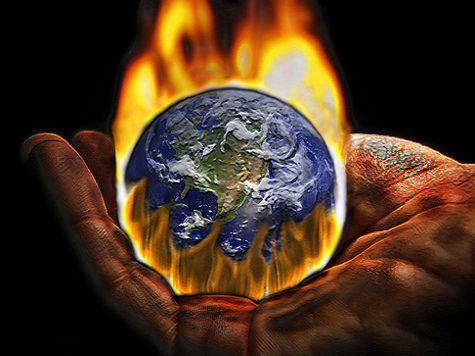|
The most important warnings and recommendations
how to solve Humanity's problems and challenges
|
![]()
| “Doomsday Clock” are closer and closer to midnight |

 |
| Right now, hundreds of U.S.-Russian and other countries nuclear weapons are locked and loaded, ready to be launched at a moment’s notice. These weapons pose a clear and present danger to human life, public health, the environment, and the global economy. Only a short burst of computer signals stands between us and disaster.
As international tensions rise, the risk that these weapons will be used also rises. We are right on the brink. Atomic Scientists, who made the decision in consultation with its board, which includes 19 Nobel Laureates, say Earth is now closer to human-caused doomsday than it has been in more than 30 years because of global warming and nuclear weaponry. This is about doomsday; this is about the end of civilization as we know it. The probability of global catastrophe is very high, and the actions needed to reduce the risks of disaster must be taken very soon. Today, unchecked climate change and a nuclear arms race resulting from modernization of huge arsenals pose extraordinary and undeniable threats to the continued further existence of Humanity. The loss of biodiversity is one of the most critical current environmental problems, threatening valuable ecosystem services and human well-being. And present world leaders have failed to act with the speed or on the scale required to protect Earth citizens from potential catastrophe. These failures of today's leadership endanger every person on Earth. Three minutes is too close. Far too close. The members of the Science and Security Board of the Bulletin of the Atomic Scientists, want to be clear about their decision not to move the hands of the Doomsday Clock in 2016: That decision is not good news, but an expression of dismay that world leaders continue to fail to focus their efforts and the world's attention on reducing the extreme danger posed by nuclear weapons and climate change. When they call these dangers existential, that is exactly what the members mean: They threaten the very existence of civilization and therefore should be the first order of business for leaders who care about their constituents and their countries. The Scientists recognize that some progress has been made on the nuclear and climate fronts - the Paris climate accord and the Iran nuclear agreement. But those two accomplishments are far from sufficient to address the daunting array of major threats the world faces. A new Cold War looms, with absolutely insupportable, extraordinarily expensive, extremely shortsighted nuclear "modernization" programs continuing apace around the world. Paris notwithstanding, the fight against climate change has barely begun, and it is unclear that the nations of the world are ready to make the many hard choices that will be necessary to stabilize the climate and avert possible environmental disasters. Because of failures in world leadership during 2015, it is clear that the recommendations for action in last year's Doomsday Clock announcement are, very unfortunately, at least as relevant today as they were a year ago, and that the North Korean situation requires renewed focus. The Scientists therefore call on the citizens of the world to demand that their leaders: ● Dramatically reduce proposed spending on nuclear weapons modernization programs. The United States and Russia have hatched plans to essentially rebuild their entire nuclear triads in coming decades, and other nuclear weapons countries are following suit. The projected costs of these "improvements" to nuclear arsenals are indefensible, and they undermine the global disarmament regime. ● Re-energize the disarmament process, with a focus on results. The United States and Russia, in particular, need to start negotiations on shrinking their strategic and tactical nuclear arsenals. The world can be more secure with much, much smaller nuclear arsenals than now exist—if political leaders are truly interested in protecting their citizens from harm. ● Engage North Korea to reduce nuclear risks. Neighbors in Asia face the most urgent threat, but as North Korea improves its nuclear and missile arsenals, the threat will rapidly become global. Now is not the time to tighten North Korea’s isolation but to engage seriously in dialogue. ● Follow up on the Paris accord with actions that sharply reduce greenhouse gas emissions and fulfill the Paris promise of keeping warming below 2 degrees Celsius.The 2-degree-above-pre-industrial-levels target is consistent with consensus views on climate science and is eminently achievable and economically viable, providing poorer countries are given the support they need to make the post-carbon transition and to weather the impacts of the warming that is now unavoidable. ● Deal now with the commercial nuclear waste problem. Reasonable people can disagree on whether an expansion of nuclear-powered electricity generation should be a major component of the effort to limit climate change. Regardless of the future course of the worldwide nuclear power industry, there will be a need for safe and secure interim and permanent nuclear waste storage facilities. ● Create institutions specifically assigned to explore and address potentially catastrophic misuses of new technologies. Scientific advance can provide society with great benefits, but the potential for misuse of potent new technologies is real, and government, scientific, and business leaders need to take appropriate steps to address possible devastating consequences of these technologies. Last year, the Science and Security Board moved the Doomsday Clock forward to three minutes to midnight, noting: "The probability of global catastrophe is very high, and the actions needed to reduce the risks of disaster must be taken very soon." That probability has not been reduced. The Clock ticks. Global danger looms. Wise leaders should act—immediately. |
| According to Prof Stephen Hawking Humanity is at risk from a series of dangers of our own making |

|
| Nuclear war, global warming and genetically-engineered viruses are among the scenarios that further progress in science and technology can initiate and develop. We are not going to stop making progress, or reverse it, so we have to recognise the dangers and control them. But future generations of researchers should be aware of how scientific and technological progress is changing the world, and to help the wider public understand it. It's important to ensure that these changes are heading in the right directions. In a democratic society, this means that everyone needs to have a basic understanding of science to make informed decisions about the future. |
|
 |
 |
 |
 |
 |
 |
 |
 |
 |
|
 |
 |
|
|
|
|
 |
 |
|
 |
 |
 |
 |



All rights reserved © glob-use.org











